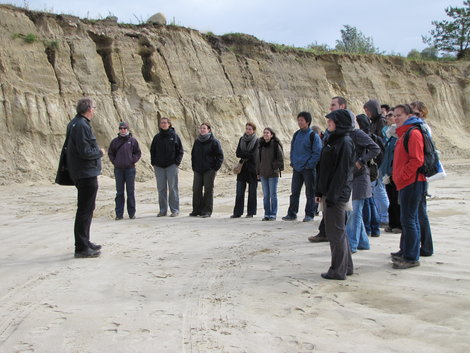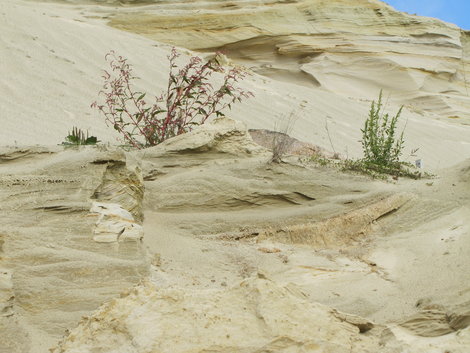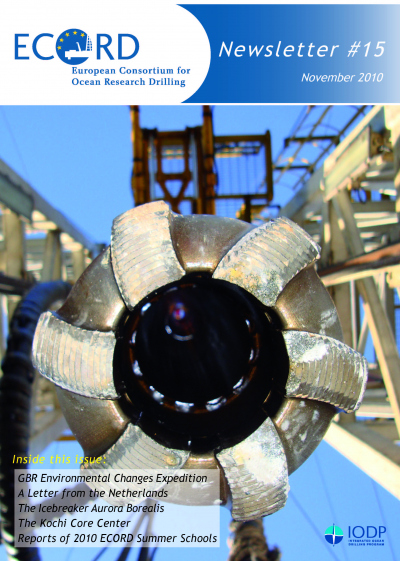Die Inhalte dieser Seite sind leider nicht auf Deutsch verfügbar.
Seitenpfad:
ECORD Summer School 2010
“Dynamics of Past Climate Changes”
13-24 September 2010
at the MARUM - Center for Marine Environmental Sciences and
the IODP Bremen Core Repository, University of Bremen, Germany
the IODP Bremen Core Repository, University of Bremen, Germany
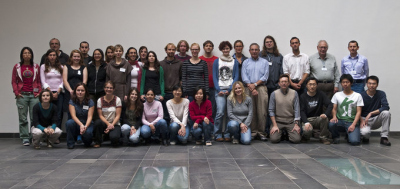
1 The Aim
The major goal was to bring PhD students and young Postdocs in touch with IODP at an early stage of their career, inform them about the actual research within this international scientific program, and to prepare them for future participations in IODP expeditions. Such training will be achieved by taking the summer school participants on a “virtual ship” where they get familiarized with a wide spectrum of state-of-the-art analytical technologies and core description methods according to the high standards on IODP expeditions. Therefore the course was equally balanced, with half the time dedicated to lectures and discussions and the other half to laboratory exercises.
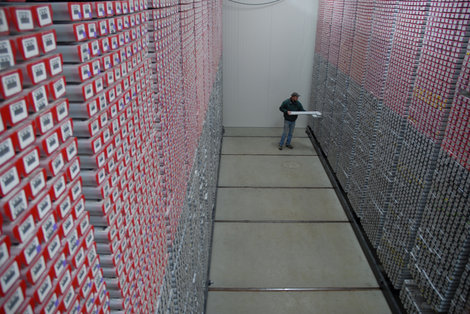
Located on the university campus, MARUM hosts the IODP Bremen Core Repository (BCR), the only IODP core repository in Europe.
2 Location and Organisation
The ECORD Summer School on “Dynamics of Past Climate Changes” 2010 was held 13-24 September, 2010 at the MARUM – Center for Marine Environmental Sciences, Bremen University, Germany. It has been organized by Prof. Dierk Hebbeln, Director of the Bremen International Graduate School for Marine Sciences „Global Change in the Marine Realm“ (GLOMAR), by Prof. Dr. Michael Schulz, head of the Geosystem Modelling at the University of Bremen, and by Dr. Ursula Röhl, head of the IODP Bremen Core Repository (BCR). GLOMAR, MARUM and BCR jointly offered the unique training possibilities used for this summer school by providing laboratory facilities and by providing a seminar room equipped with 20 laptops (internet access, MatLab etc.).
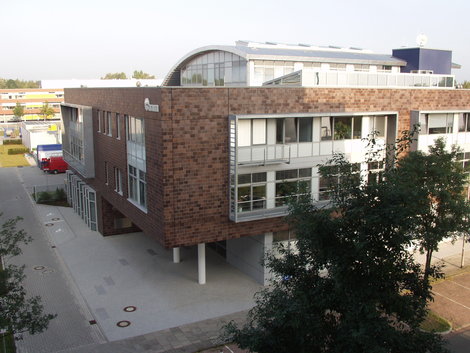
MARUM - Center for Marine Environmental Sciences
3 The Topic
There is particular public and political focus on the role of anthropogenic greenhouse gases as a driver for the observed warming trend in global climate. IODP findings within paleoclimate research have gained strong societal interest and were recently recognized by the Intergovernmental Panel on Climate Change as an important contributor to understand processes of climate change. Correspondingly, the topic covered here is highly relevant in terms of assessing: (1) how and why rapid major changes in climate and sea-level have happened in the past; (2) critical parameters and thresholds in Earth systems affecting climate change; and (3) what extremes might be possible for our planet and their implications for future climate change.
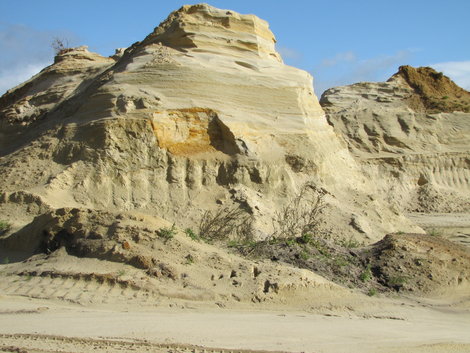
4 Programme
The two-week course combined lectures and interactive discussions on mid-ocean ridges with practical exercises, with the latter mainly using the facilities of the BCR. The scientific lectures and exercises have be confined mostly to the first week, whereas the “virtual ship” related practicals took part during the second week. During the weekend in the middle of the summer school an excursion was offered. In the first week the program (see attachment) focused on lectures by and discussions with leading paleoceanographers and paleoclimatologists. The latter included climate modelers, physical oceanographers, and researchers working on polar ice cores as well as lake records. The lectures and discussions, given and guided by leading scientists from the field (see below), have been grouped in the following sub-themes:
1. Climate response to orbital forcing
2. Millennial-scale climate variability
3. Linkages between climate and tectonics
4. Sea-level changes
5. Paleoproductivity, carbon burial through time, high CO2 worlds
The weekend between the first and the second week gave the participants the possibility to join a field trip to the Late Quaternary landscapes in the vicinity of Bremen on Saturday, and to explore the city of Bremen at the free Sunday. The second week of the summer school took advantage of the unique facilities of the Bremen IODP core repository and labs and aimed at introducing PhD students and young Postdocs to a full range of IODP related topics from general introduction to the program to compiling of IODP proposals and to get an insight into “shipboard” methodologies applied on the drilling vessels. The focus was on group-based practicals focusing on standard shipboard methodologies such as core description, physical properties, stratigraphy, borehole logging, etc..
1. Climate response to orbital forcing
2. Millennial-scale climate variability
3. Linkages between climate and tectonics
4. Sea-level changes
5. Paleoproductivity, carbon burial through time, high CO2 worlds
The weekend between the first and the second week gave the participants the possibility to join a field trip to the Late Quaternary landscapes in the vicinity of Bremen on Saturday, and to explore the city of Bremen at the free Sunday. The second week of the summer school took advantage of the unique facilities of the Bremen IODP core repository and labs and aimed at introducing PhD students and young Postdocs to a full range of IODP related topics from general introduction to the program to compiling of IODP proposals and to get an insight into “shipboard” methodologies applied on the drilling vessels. The focus was on group-based practicals focusing on standard shipboard methodologies such as core description, physical properties, stratigraphy, borehole logging, etc..
Lecturers
| Name | Institute |
| Karl-Heinz Baumann | MARUM, Bremen |
| Torsten Bickert | MARUM, Bremen |
| Sarah Davies | University of Leicester |
| André Droxler | Rice University, Houston, Texas |
| Gerhard Fischer | MARUM, Bremen |
| Thomas Frederichs | MARUM, Bremen |
| Walter Hale | MARUM, Bremen |
| William Hay | University of Colorado Museum |
| Dierk Hebbeln | GLOMAR / MARUM, Bremen |
| Dave Hodell | University of Cambridge |
| Holger Kuhlmann | MARUM, Bremen |
| Ken Miller | Rutgers University (USA) |
| Alan Mix | Oregon State University (USA) |
| Mahyar Mohtadi | MARUM, Bremen |
| Matthias Prange | MARUM, Bremen |
| Ursula Röhl | MARUM, Bremen |
| Luzie Schnieders | MARUM, Bremen |
| Michael Schulz | MARUM, Bremen |
| Luke Skinner | University of Cambridge (UK) |
| Stephan Steinke | MARUM, Bremen |
| Thomas Westerhold | MARUM, Bremen |
5 Participants
A total of 28 PhD students and young post-docs from several European countries participated in the ECORD Summer School.
During the summer school, the participants were given the opportunity to present their own projects in 15-minutes talks. Ms Rachel Brackenridge (Heriot-Watt University, Edinburgh), Mr Patrick Grunert (University of Graz), Mr Enqing Huang (MARUM / University of Bremen), Ms Chloé Pretet (University of Geneva), and Ms Kira Rehfeld (PIK Potsdam / Humboldt University Berlin) received awards for best oral presentations.
During the summer school, the participants were given the opportunity to present their own projects in 15-minutes talks. Ms Rachel Brackenridge (Heriot-Watt University, Edinburgh), Mr Patrick Grunert (University of Graz), Mr Enqing Huang (MARUM / University of Bremen), Ms Chloé Pretet (University of Geneva), and Ms Kira Rehfeld (PIK Potsdam / Humboldt University Berlin) received awards for best oral presentations.
6 Feedbacks
During the summer school and especially at its end, we received overwhelming positive feedback from the participants, especially with respect to the very dedicated lecturers.



